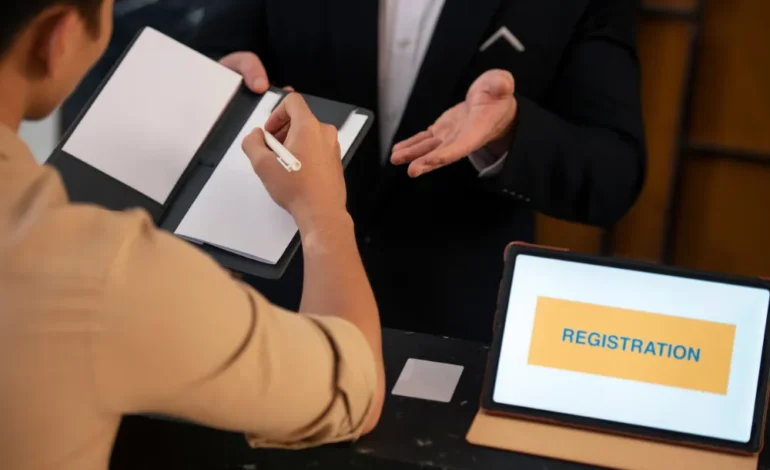Many times, people consider Trust Registration Service as the means of safeguarding their valuable possessions. Still, what does that actually imply? How would it go? More crucially, then, do you need it?
Using a friendly tone and a tale or two to make it more genuine, let’s dissect it all in plain language.
A brief narrative to get us going.
Come meet Priya. She owns a modest company and has two children. She worked hard all her life, much like many of us did. Her buddy questioned her, “Have you registered your trust?” one day. Blinking, Priya Her companion answered, “What’s that? You really should check into the Trust Registrations Service.”
Priya searched a little that evening but came onto a lot of legal language. She then gave up.
Should you be like Priya, this page is just for you. We will walk through methodically to demonstrate how the Trust Registrations Service operates and why it is important to families, people, even companies.
Describes a Trust
A trust is a legal structure whereby one person—known as the settler—manages their possessions under the direction of another—known as the trustee—for the advantage of another person—called the beneficiary.
Imagine you giving your money to a friend and saying, “Keep this safe and use it for my child’s education when the time comes.”
Using trusts helps:
- Guard wealth.
- Steer clear of involved long probate procedures.
- Make wise plans for estates.
- Lessen the tax load.
- Safe valuables for dependents or children
What then is trust registration service?
A government mechanism called the Trust Registration Service records several kinds of trusts. Many nations handle this system through the appropriate tax offices.
The principal objective is To increase openness and stop illicit operations like money laundering.
Any trust falling within specific guidelines has to be registered using this tool. This covers charitable trusts, corporate trusts, and many family trusts.
Why is registration of trust services needed?
The truth is that authorities want to make sure money isn’t concealed or abused since the world is more linked nowadays.
Setting up a trust and monitoring it under the radar was simple before this technology. Governments increasingly seek to know the person behind every trust.
- That is where the Trust Registration Service finds application. It aids:
- Make notes on helpful owners.
- Promote tax compliance.
- Support openness in finances.
- Stop unlawful transactions or fraud.
When should one use the service?
Though many do, not every trust requires registration.
If you find yourself needing to register your trust, then:
- It pays taxes, either capital gains tax or income tax.
- It treats its assets—that is, property—as taxable.
- This trust involves financial transactions.
- Under legal standards, it is a “complex” trust.
Always refer to your country’s particular laws. Your location will affect the requirements.
The Methodical Approach of Trust Registration Service
Suppose you have decided you should register your trust. terrific! Usually, this is how it goes:
1. Get Trust Information.
Get ready before starting by gathering:
- The trust’s name and founding date
- Specifics of the settler, trustees, and beneficiaries
- An account of the trust’s owned assets
- Referencing taxes, if relevant
2. Register online.
Many nations have you start the process using a government portal. You will have to open an account if you do not already have one.
3. Add the Trust Information here.
Following logged in:
- Complete the trust’s name, kind, and founding date.
- Now enter the names and information of every participant.
- Tell whether the trust owes taxes.
- Add asset data if necessary.
4. Review and send.
Double-check every field before turning in. Errors might cause delays or maybe fines.
The Trust Registration Service files your application once you hit submit.
5. Maintaining Records Current
Made? Not really close. Every change—including a new trustee or beneficiary—you are expected to report in the files.
Is there anything the process costs?
Generally speaking, registering a trust personally with the Trust Registration Service is free.
If you seek assistance from a legal practitioner or accountant, though, they might charge a service fee. If the trust is complicated or very valuable, this is usually well worth it.
What happens should you not register?
Here things start to get real.
Ignoring mandatory registration might result in fines, tax enquiries, or legal action. It’s best not to wait since governments are closing down unregistered trusts.
Oh Priya, remember? To register her trust, she finally paid a specialist. Knowing everything was done perfectly provided her peace of mind; she could then concentrate on her family and company.
Often asked questions are:
Is Something I Could Do Myself?
Yes. Should the trust be basic, the Trust Registration Service is meant to be easy for use. Just use great care in following the directions.
What would happen if my trust is really old?
If an ancient trust satisfies the new legal definitions, it could also have to be registered. Review current rules to be sure you are not exempt.
Affect all trusts here?
Not one. Among those exempt are some bare trusts, charitable trusts, and those with little activity. Again, it relies on the law of your nation.
FAQS
Who needs to register a trust?
If a trust has tax obligations, holds property, or meets other legal criteria, it likely needs to be registered. Most family, business, and discretionary trusts fall under these rules. Always check your country’s latest regulations to be sure.
Is the Trust Registration Service free to use?
Yes, registering a trust yourself using the official Trust Registration Service portal is usually free. However, hiring a lawyer or accountant to help you with the process may involve service fees.
What happens if I don’t register my trust?
If you fail to register a trust that legally must be recorded, you may face penalties, fines, or even tax investigations. Governments are now more strict about enforcing trust transparency rules.
Can I register a trust without legal help?
Absolutely! Many people register simple trusts on their own using online platforms. However, if your trust is complex or involves large assets, it’s wise to consult a financial advisor or legal expert for guidance.
Closing Notes
Though it seems technical, the Trust Registration Service is essentially about financial responsibility and legal compliance.
Understanding how it all works can help you whether your plans call for a family trust, estate protection, or for your children.
And in doubt? See a qualified tax consultant or financial advisor. They can walk you precisely step by step.
So the next time someone probes, “Have you registered your trust?” You can smile and reply, “Yes—I have it covered.”







